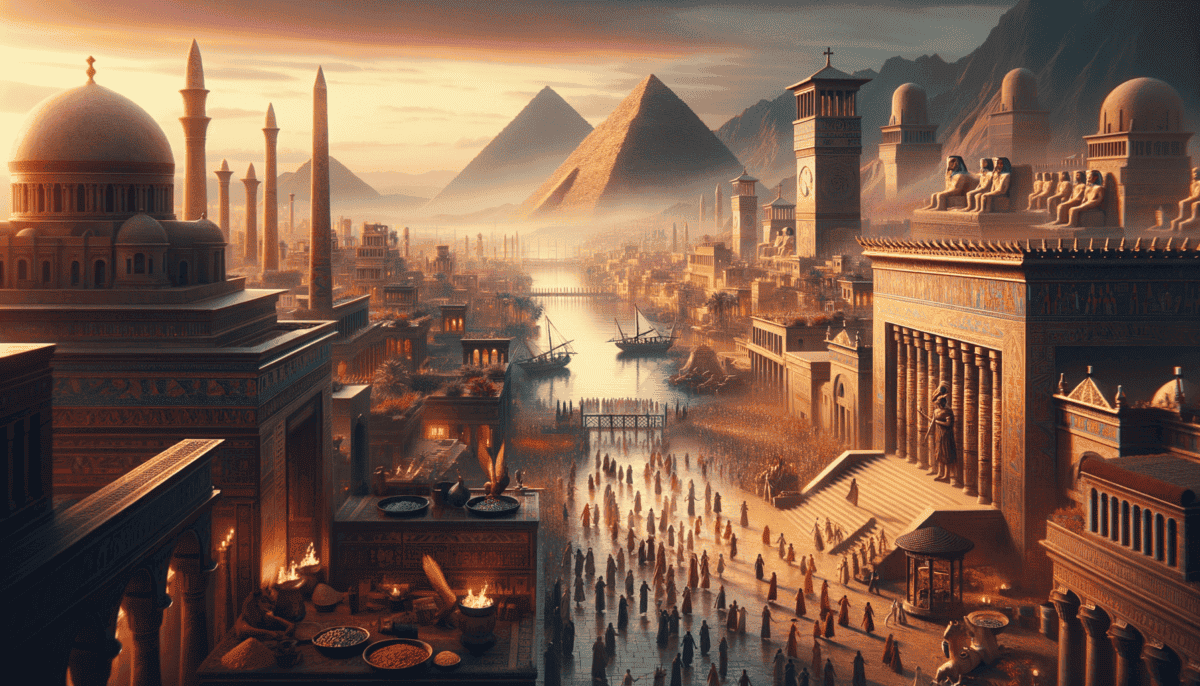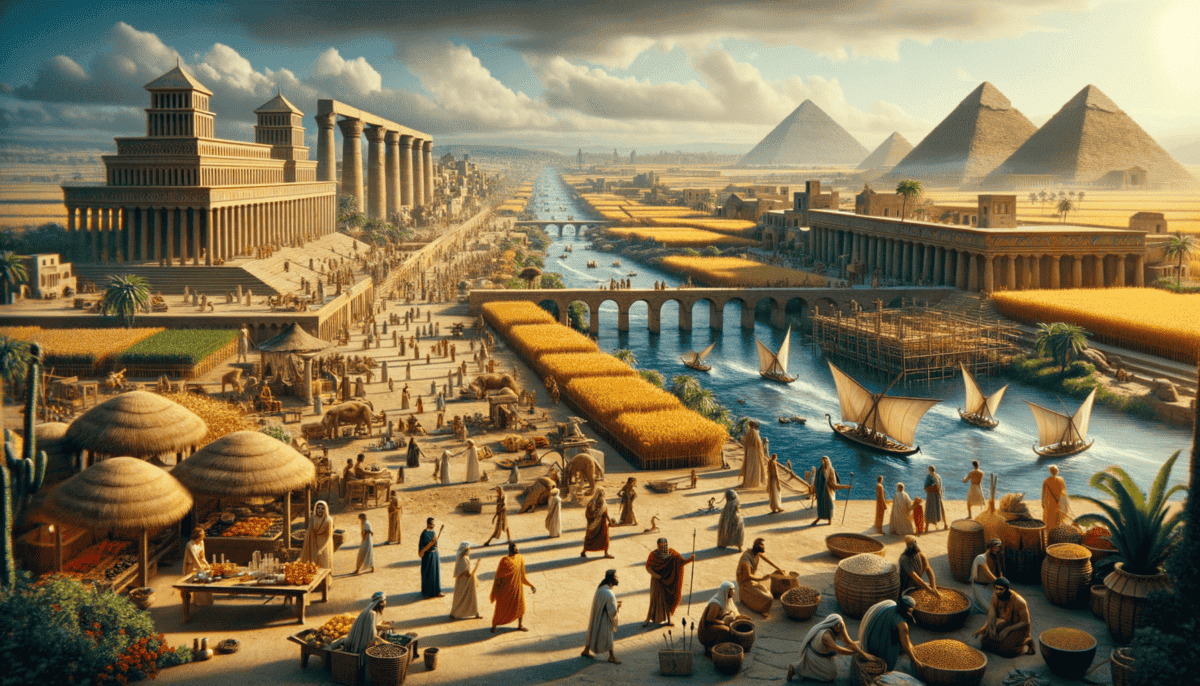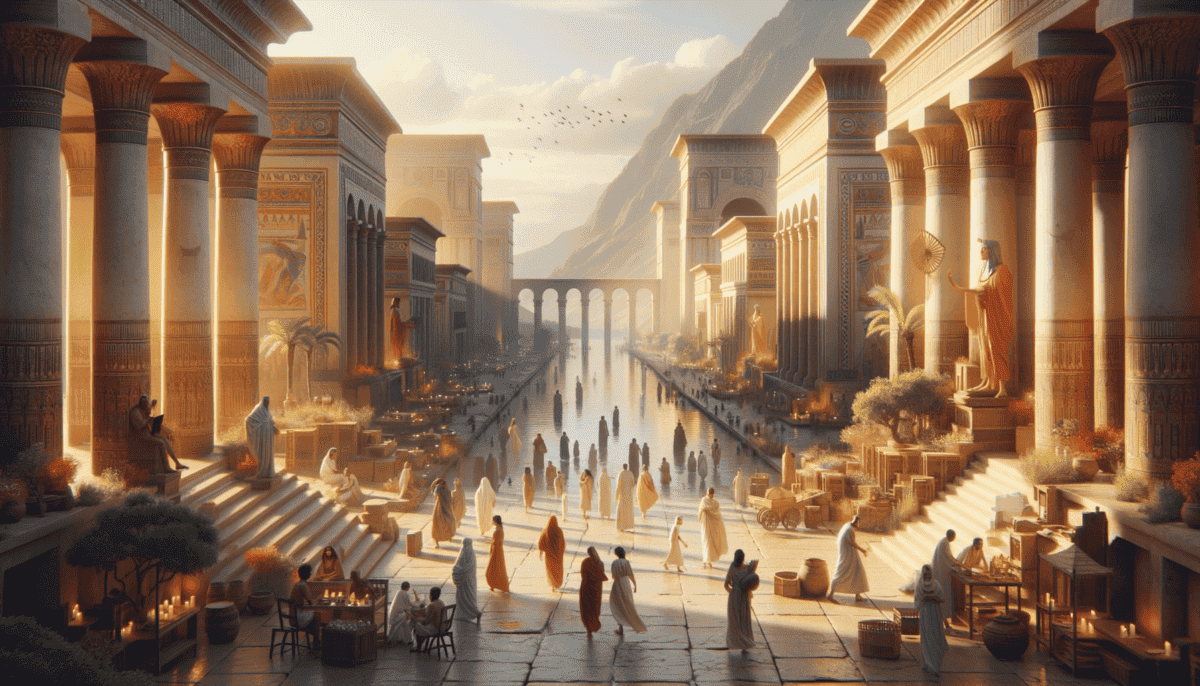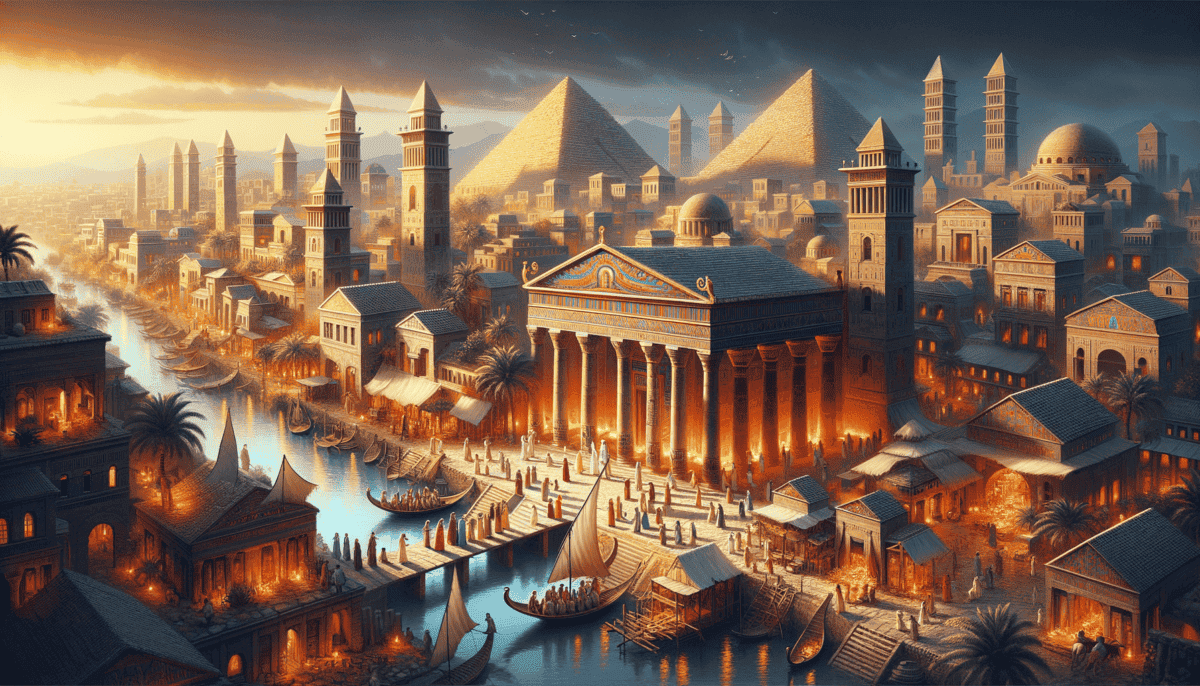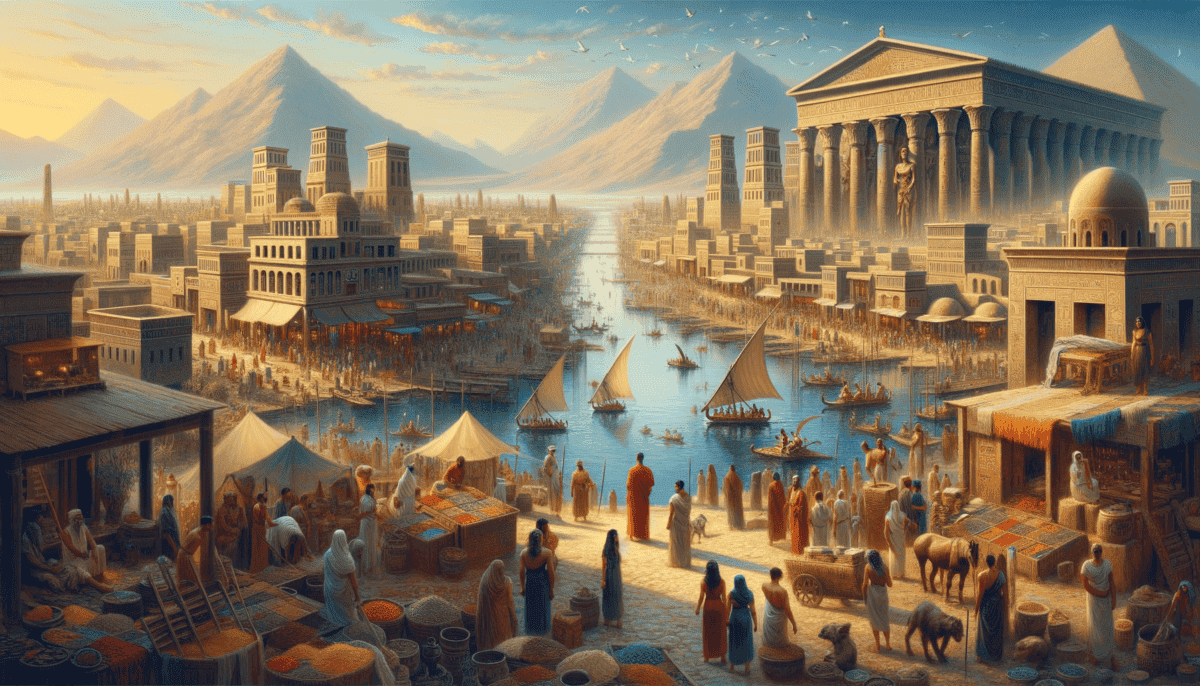The Winds of Conquest
The hot Egyptian sun beat down on Alexandria's marble streets as twelve-year-old Aria peered through her window. Ships dotted the blue waters of the harbor – but these weren't the usual trading vessels. Their red sails marked them as Roman warships.
"Papa, look!" Aria called out to her father. "More Roman ships are coming!"
Kedesh, Aria's father, placed a gentle hand on her shoulder. His eyes were filled with worry as he watched the approaching fleet.
"The Romans are getting closer every day, little one," he said softly. "Things are about to change in Egypt."
Aria loved walking through Alexandria's bustling marketplace with her father. The air always smelled of spices and fresh bread. But today felt different. The usual happy chatter was replaced by worried whispers about Romans and Queen Cleopatra.
"Why is everyone so worried, Papa?" Aria asked as they walked past a group of people arguing about the Romans.
"Queen Cleopatra and Mark Antony lost a big battle against Octavian," Kedesh explained. "Now Octavian is coming to Egypt with his army."
Aria remembered seeing Queen Cleopatra once during a festival. She had been beautiful and grand, wearing golden robes that sparkled in the sunlight. The queen had seemed so strong then.
Later that evening, drums echoed through the city streets. Aria and her father rushed to their rooftop terrace. They could see torches moving toward the royal palace.
"The Romans are here," Kedesh whispered.
The next few days were a blur of activity. Soldiers in red cloaks marched through the streets. People stayed in their homes, afraid to go out. Then came the news that changed everything: Queen Cleopatra was dead.
A New Beginning
Aria sat with her father in their courtyard, listening to the sounds of the city. Roman voices mixed with Egyptian ones now. Ships full of Roman officials kept arriving at the harbor.
"What happens now, Papa?" Aria asked, playing with her wooden doll.
"Egypt belongs to Rome now," Kedesh said. "But we are strong, little one. Like the Nile, we will flow on."
He smiled and pulled out a small package wrapped in linen. "I got you something from the market."
Inside was a beautiful bracelet with blue and green beads.
"See these colors?" her father pointed. "Blue like the Nile, green like the fertile lands it brings us. No matter what changes come, Egypt will always be in our hearts."
Aria slipped the bracelet on her wrist, watching it sparkle in the evening light. Outside their walls, Alexandria was becoming a Roman city. But as she sat there with her father, watching the sunset paint the sky in beautiful colors, she felt hope growing in her heart.
That night, Roman trumpets sounded across the harbor. A new chapter was beginning for Egypt, and Aria knew she would be there to see it all unfold.
"Tomorrow we'll go see the new ships coming in," her father promised. "The Romans are bringing new things to trade. Perhaps we can find opportunities in these changes."
Aria nodded, touching her new bracelet. She was scared but also curious about what this new world would bring.
A New World Order
The morning sun sparkled on the blue waters of Alexandria’s harbor. Aria watched as Roman workers built new docks. It had been three months since Queen Cleopatra’s death. The city looked different now. ️
“Look how fast they work!” Aria said to her father as they walked along the waterfront.
Kedesh nodded. “The Romans are good builders. See those tall columns they’re putting up? They’re making a new marketplace.”
A group of Roman officials walked past in their white togas. Leading them was Marcus Flavius, the new tax collector. He stopped when he saw Kedesh.
“Ah, the merchant Kedesh!” Marcus smiled. “Just the man I wanted to see. Will you join us for dinner tonight? We’re discussing new trade routes to Rome.”
Aria watched her father bow politely. “It would be an honor, Marcus.”
As they walked home, Aria noticed more changes in their neighborhood. Roman-style shops had opened. Children played games with both Egyptian and Roman toys. The smell of new Roman foods mixed with familiar Egyptian spices.
Learning New Ways
“Papa, why are you learning Latin?” Aria asked that afternoon, watching her father practice Roman writing on a wax tablet.
“We must adapt, little one. The Romans control trade now. Speaking their language will help our business grow.”
That evening, their cook Neferet prepared both Egyptian and Roman dishes for dinner. Aria helped by arranging olive oil and grape leaves on the table.
“Times are changing,” Neferet said, seasoning a fish. “But at least the Romans like good food!”
When Marcus arrived with his wife Julia, Aria watched carefully from behind a column. Julia wore beautiful silk clothes and spoke kindly to everyone.
“Your daughter is welcome to join us,” Julia called out, spotting Aria. “I’d love to meet her.”
Aria shyly joined the adults. Julia showed her a Roman-style necklace and taught her a Roman game with stones.
Growing Challenges
Not everyone was happy with the changes. The next morning, Aria heard angry voices in the marketplace. Some Egyptian merchants were arguing with Roman guards about new taxes.
“It’s not fair!” one merchant shouted. “We can’t pay so much!”
Kedesh pulled Aria away from the scene. “Some changes are hard, my dear. But we must find ways to work together.”
At home, Aria practiced writing her name in both Egyptian and Latin. She drew pictures of the new buildings going up in the city. Everything was different now, but maybe different wasn’t all bad.
That night, she heard her father talking with other merchants in their courtyard. They were planning ways to work with the new Roman systems while keeping their Egyptian traditions alive.
“We are like the reeds of the Nile,” one old merchant said. “We bend with the wind, but we do not break.”
Aria touched the bracelet her father had given her months ago. Its blue and green beads reminded her that some things would always stay the same, even as the world around them changed.
A cool evening breeze carried the sound of both Egyptian music and Roman trumpets across the city. Tomorrow would bring more changes, more challenges, and maybe even new friends.
The Grain Merchants
The morning market buzzed with activity. Aria helped her father count sacks of golden wheat. The sweet smell of grain filled the air.
“Six hundred sacks ready for Rome!” Kedesh announced proudly. “Our biggest shipment yet!”
Marcus Flavius strode through the warehouse, his red cape swishing. “Excellent work, Kedesh! The Emperor will be pleased.”
Aria watched Roman sailors load the wheat onto their huge ships. The vessels had tall masts and colorful sails. Some were big enough to carry thousands of sacks!
Family Business
“Can I help more with the trading, Papa?” Aria asked, tugging her father’s sleeve.
Kedesh smiled. “Of course! You can start by learning to use this.” He handed her a Roman counting board with smooth pebbles.
Julia appeared, carrying a basket of figs. “I can teach her! Roman numbers are easy once you know the trick.”
The two spent the morning practicing math while watching the busy harbor. Ships came from all over – Greece, Syria, and even far-away Spain!
“Look!” Aria pointed. “That ship has purple sails. Where’s it from?”
“Phoenicia,” Julia explained. “They trade in special purple dye. Very expensive!”
Growing Troubles
But not everything was going smoothly. Later that day, Aria overheard worried voices in her father’s office.
“The new wheat prices are too low!” complained merchant Thutmose. “We can’t make enough to pay the taxes.”
Kedesh sighed. “We must find a way. Rome needs our wheat, and we need their trade.”
That evening, Aria helped Neferet make dinner. “Why are people angry about the wheat?” she asked.
“It’s complicated, little one. The Romans want more wheat for less money. But growing wheat is hard work.”
Finding Solutions
Kedesh called a meeting of merchants at their house. Aria served honey cakes while they talked.
“What if we work together?” her father suggested. “Share ships, split the costs?”
Marcus listened carefully. “I could speak to Rome about adjusting some taxes.”
The merchants discussed long into the night. Aria practiced her numbers by counting stars through the window.
The next morning brought exciting news. Rome had agreed to new trade terms! Kedesh hugged Aria tight.
“See? Problems can be solved when people work together,” he said.
Aria watched more ships arrive at the harbor. She thought about all the people in Rome who would eat bread made from their wheat. Maybe trade wasn’t just about money – it was about connecting people too.
That afternoon, she helped paint their family’s name on new grain sacks – in both Egyptian hieroglyphs and Latin letters. The future would need both the old ways and the new.
As the sun set, Julia taught her a Roman song about sailors and sea winds. The melody mixed perfectly with the Egyptian songs floating from the market. Perhaps their two worlds could blend like music.
Rivers of Knowledge
The great Library of Alexandria rose before Aria like a palace of wisdom. Sunlight sparkled off its marble columns.
“Welcome to your first day,” smiled Theron, the Greek librarian. His gray beard reminded Aria of a wise owl.
“Can I really help organize the scrolls?” Aria bounced on her toes with excitement.
“Indeed! Julia recommended you highly. She says you’re quick with both Egyptian and Latin.”
A World of Words
The inside of the library took Aria’s breath away. Shelves stretched up to the ceiling. Scholars in bright robes walked between tables covered with scrolls.
“Look here,” Theron pointed to a shelf. “Egyptian medical scrolls on one side, Roman ones on the other. We can learn from both!”
A Roman doctor named Rufus was studying the Egyptian writings. “Your people knew so much about healing,” he told Aria. “I’m learning new things every day!”
Special Discovery
While dusting shelves, Aria found an old scroll about stars. The pictures showed both Egyptian and Greek star patterns.
“The sky belongs to everyone,” said Claudia, a Roman astronomer. “Stars don’t care about borders!” ⭐
Claudia showed Aria how to use a Roman star map. Together they found patterns that Egyptian sailors had used for years.
New Ideas
Each day brought new wonders. Aria watched Roman engineers study Egyptian building methods. Greek doctors learned about Egyptian medicines.
“Knowledge grows when shared,” Theron said, watching scholars from different lands work together.
One morning, Julia arrived with exciting news. “The Emperor wants more Egyptian books copied for Rome’s libraries!”
Aria helped match scrolls with the best copyists. Some knew hieroglyphs, others Latin or Greek. They needed everyone’s skills.
Growing Questions
Not everyone liked the changes. Some priests worried about sacred texts leaving Egypt.
“Our knowledge is special,” one priest told Aria. “Should we share everything?”
Aria thought carefully. “Maybe sharing helps keep ideas safe? More copies means stories can’t be lost.”
That evening, she told her father about her day. “The library is like the grain trade,” she said. “Everyone brings something different, and everyone gains!”
Kedesh smiled proudly. “You’re learning wisdom beyond books, little one.”
Special Project
Theron gave Aria an important job. She would help create a scroll about Egyptian plants, with their names in three languages!
“This way,” he explained, “healers everywhere can use Egyptian plant medicine.”
Working with scribes from different lands, Aria saw how each language had special ways to describe things. Together, they made something new and wonderful.
As the sun set, Aria watched scholars leave with scrolls full of shared wisdom. Like the Nile flowing to the sea, knowledge couldn’t be held back. It wanted to flow freely, enriching everyone it touched.
Whispers of Change
Dark clouds gathered over Alexandria’s harbor as Aria hurried home from the library. Something felt different in the city’s mood. ️
“Did you hear?” a fish seller whispered to her neighbor. “They’re raising the grain tax again!”
Troubled Waters
At home, Kedesh paced the courtyard. “The Romans want more grain, but farmers can barely feed their families!”
“Can’t we help them, Papa?” Aria asked.
“It’s not that simple, little one. The new tax collector, Marcus, won’t listen.”
Secret Meetings
That night, Aria heard voices from her father’s study. She recognized her uncle Ramose’s deep voice:
“The people are ready to fight back! We can’t let Rome take everything!”
Kedesh spoke softly. “Violence will only bring more trouble.”
“Then what do we do?” Ramose demanded.
Aria’s heart beat faster. She had never heard her uncle so angry.
Hard Choices
The next day at the library, Aria couldn’t focus on her scrolls. She noticed fewer Egyptian scholars coming to study.
“The library feels empty,” she told Theron.
He nodded sadly. “Some think we work too closely with Rome. But knowledge shouldn’t have sides.”
Taking Action
Aria had an idea. She asked Julia to help her write a letter to Marcus in perfect Latin:
“Dear Sir, Our farmers need help. If they can’t eat, they can’t grow Rome’s grain. Please listen to their stories…”
Julia looked worried. “Be careful, Aria. Some Romans don’t like being told what to do.”
Street Whispers
Walking home, Aria saw angry words painted on walls. People gathered in small groups, talking in low voices.
A boy her age ran past, shouting: “Meeting tonight! Tell everyone!”
That evening, crowds filled the streets. Some carried torches. Others had sticks.
Making Peace
Aria found her father getting ready to leave. “Where are you going, Papa?”
“To talk with Marcus. Someone must try to make peace.”
“I’m coming too!” Aria held up her letter.
Kedesh smiled proudly. “Maybe a child’s wisdom is what we need.”
Together, they walked toward the Roman quarter. Behind them, angry voices grew louder in the gathering dark. The air felt heavy with change, like before a big storm. ⚡
Legacy of Two Worlds
The sun rose over Alexandria’s harbor, painting the sky in brilliant orange. Aria stood with her father outside Marcus’s office, clutching her letter.
“Remember,” Kedesh whispered, “speak from your heart.”
A Voice of Change
Marcus sat behind a big wooden desk, looking stern. But when Aria read her letter, his expression softened.
“A young girl who writes such perfect Latin,” he said, “and cares so much for her people…”
Marcus stood up. “Perhaps we can find a better way. Tell me more about these farmers.”
Building Bridges
Over the next few weeks, things began to change. Marcus lowered the grain tax. He started listening to Egyptian farmers.
“Look, Papa!” Aria pointed to the marketplace. “Roman and Egyptian children playing together!”
Kedesh smiled. “When we try to understand each other, good things happen.”
Growing Together
The library buzzed with new energy. Egyptian and Roman scholars worked side by side. Theron created a special room for Egyptian scrolls.
“Knowledge grows when we share it,” he told Aria. “Just like friendship.”
Julia taught Aria more Latin, while Aria helped Julia learn Egyptian hieroglyphs.
A New Alexandria
Years passed. Aria grew taller and wiser. Alexandria changed too. Roman temples stood next to Egyptian ones. People spoke Latin, Greek, and Egyptian in the streets.
Looking Forward
One evening, Aria sat in her favorite spot by the lighthouse. A small girl approached her.
“Are you the one who writes stories in both languages?” she asked.
Aria nodded. “Would you like to learn?”
The girl’s eyes lit up. “Can you teach me about both worlds?”
Aria looked out at the ships in the harbor, their sails catching the golden light. Some carried Egyptian cotton, others Roman wine. Each brought something special to share.
“That’s what Alexandria is now,” she said. “A place where two worlds come together to make something wonderful.” ⭐
Above them, the great lighthouse beam swept across the darkening sky, lighting the way for ships from every corner of the empire. In its glow, Aria saw the future – not just Egyptian, not just Roman, but something new and amazing that belonged to everyone.
As stars appeared in the purple sky, Aria knew that while some things change, the most important things – friendship, understanding, and hope – would always light the way forward.


